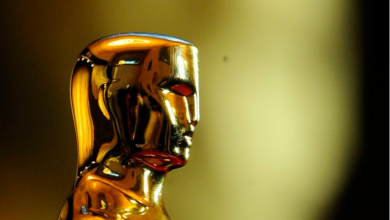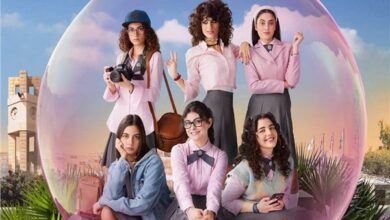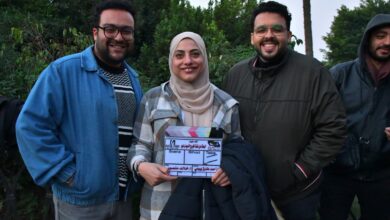After a six-year absence from the cinematic scene, director Hani Khalifa has returned with a new television drama, "El-Gamaa" ("University"). Khalifa remains unique in his generation of Egyptian directors, whose debut feature film, "Sahar El Layali," or "Sleepless nights" (2003), represented a breakthrough in contemporary Egyptian film.
Khalifa introduced a serious social drama that became a blockbuster, receiving awards at the Damascus Film Festival (2003) and the Paris Biennal for Arab Cinema (2004). Poised between commercial and artistic cinema, Khalifa tries unremittingly to create simple but beautiful films, combining artistic considerations with box-office potential.
In an exclusive interview, Khalifa spoke to Al-Masry Al-Youm about cinema, society and all that lies between.
Al-Masry Al-Youm: Why did you decide to return to television drama after a six-year absence?
Hani Khalifa: It wasn’t a decision. I would have preferred to start immediately shooting my second movie, but I’m not the kind of artist that thrives on working on a huge number of projects. My movies are part of my personal journey. I’m trying to be as honest as possible to my narratives, reflecting the sincerity and sensitivity of my work.
Al-Masry: Why did you return to TV drama with “El Gamaa”?
Khalifa: I met the producer and manager of Al Karma production house and was impressed by his ambitions to produce a social drama that would represent a real change in television production. In “El Gamaa,” I’m a member of a big team where everyone has an influential role–a true regeneration of the traditional system of production.
Al-Masry: How is it different from traditional television series?
Khalifa: Unlike conventional TV, the budget here isn’t spent on big stars. It’s dedicated to enhancing the picture, cutting, actors’ training and ideas.
Al-Masry: What is unique about “El Gamaa”?
Khalifa: We’re trying to create a drama for the young generation, adopting the American model while discussing our own issues and double standards–all with genuine characters and a pan-Arab scope. The pan-Arab idea is also a challenge, because we focused on the characters–not on the clichéd national stereotypes usually associated with certain countries.
Al- Masry: What is the difference between television and cinema?
Khalifa: Television is a limited type of entertainment that lacks a certain level of depth. In contrast, cinema fills your soul in a different way. The experience of filming is more established, like novel-writing. It’s a definite form that fulfills deeper needs.
Al-Masry: Do you think the commercial cinema industry hinders the potential for producing films of substance?
Khalifa: I’m inclined to respect the Egyptian cinema industry with its established structures, more than appreciating the artistic quality of Egyptian movies per se. I find we have a history of achieving prolific production cycles and we make the Arab people laugh and cry. We influence them, and this is our real strength.
Al-Masry: The commercial nature of film production is said by many to be responsible for the shallowness of contemporary Egyptian cinema. Is this a fair assessment?
Khalifa: It seems unfair to accuse our cinema of being shallow. We live in a country that produces nothing in terms of science or research; we have problems in education; we lack critical thinking. I bet no one on the street knows what the constitution is, or about the importance of science and knowledge. We know nothing about our future president, while we dream about Egypt’s victory in the football World Cup–is that logical?
On the other hand, the cinema industry is carrying on. It represents our only resource, along with art and literature. Our films are similar to our society, and may even be more advanced. In other Arab countries, there are films–but in Egypt, we have an entertainment business, along with very distinguished directors like Osama Fawzy, Yosri Nasrallah and Daoud Abdel Sayyed. We all hope for deeper films, but personally, I respect the industry because it’s the only thing we really have to develop.
Al-Masry: How do you see the independent cinema movement?
Khalifa: Commercial producers exert a mental effort and have an obvious target to succeed and make money. On the other hand, independent film makers take adventures and produce independent films with low budgets, little mass viewership and no big publicity campaigns. Still, they know how to earn their money back after selling the movies to television stations.
If you really believe in independent movies and want to support their creators, you have to complete the circle and reach for the audience. They’re satisfied about getting their money back after selling the movies to television stations.
Al- Masry: Independent cinema has been well received all over the world, no?
Khalifa: Underground cinema has a tradition all around the world. It has lovely and simple techniques that commercial cinema borrows sometimes. All genres influence each other–they’re not contradictory. But abroad, the difference lies in reception; culture is tremendously diversified. So we have to re-think our priorities and think about what we really need.
Al-Masry: Is this movement capable of achieving cinematic change?
Khalifa: Since these experiences didn’t move the audience, they need to review the concept. But with the increased number of independent film productions, big commercial producers will pay attention to these films and a sort of "fertilization" will occur. In “Heliopolis,” starring Khaled Abo el-Naga, such fertilization has already begun–the same will happen with techniques and ideas.
Al-Masry: Can revolutionary notions be introduced into commercial plots?
Khalifa: In “Sahar el-Layali,” I treated Moshira’s character [the sexually frustrated wife] very cautiously. Because I live in this society, I was trying hard to convince those of different thinking than mine–religious people for example–not to judge her and to give her problem some consideration.
It’s not an achievement to hurt someone’s feelings or demean their beliefs. My message is in the exposure itself–not the judgment. When you see and perceive others and yourself, you can better understand and sympathize–and advance your humanity.
Al-Masry: How do you see contemporary film productions compared to those of the 1980s?
Khalifa: The cinema of Atef el-Tayeb, Mohamed Khan, Khairy Bishara and Daoud Abdel Sayyed revolutionized moviemaking in Egypt. They created a new language that dwells on special moments and predicaments in human life. Social and political dilemmas were always in the background of el-Tayeb movies. The world between fantasy and reality of Bishara was remarkable–their directions were obvious. But they weren’t out of this galaxy–financial calculations were quite modest.
Al-Masry: And why did they factor the political context into their movies while your generation doesn’t?
Khalifa: This generation emerged after the October War and the collapse of the socialist dream in Egypt. Big social transformations were happening and they were burdened by heavy political issues that we’re free from–which is a double-edged sword. My generation is a bunch of scattered individuals. Nothing connects us together. We live in a more mixed-up reality.
Al-Masry: But why detach the political and social circumstances from a dramatic text?
Khalifa: When I first read “Sahar El Layali,” I didn’t like portraying rich people living in Mohandessin from my perspective as a middle-class person. But when I finished reading, I saw them as human beings and started to love them. Unfortunately, there’s a second reason related to the commercial industry–people living in shantytowns don’t like to see their stories put on film. They want to see what they want to be, what the heroine is wearing.
Al-Masry: How would you describe the current artistic atmosphere?
Khalifa: Advances in the industry have brought different rules to the market. I used to discuss with my mentor Bishara how the postmodern condition turned art into a commodity and how the abstract notion of creativity doesn’t exist anymore. This makes me think that our era has a more violent and extremist tone than the 60s and 70s, which inspired the 80s generation.
We’re preoccupied with the offensive drawings of the Prophet and the distortion of Islam and Arabs–we live in a non-romantic era. And our films are a reflection of this. There’s no comparison between the two generations. In our time, political context and social conditions are always there–just not necessarily in the foreground.




